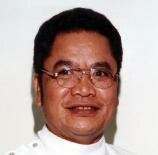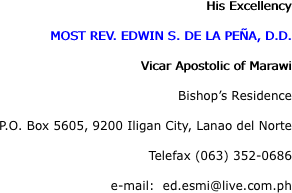The Catholic Bishops' Conference of the Philippines
The Official Website of
CBCP Online

• "To be loved by God and to be able to love Him in return—this is a human exchange is actually the essence of what Christians call the Good News, and of what Muslims mean when they refer to God as the Merciful (Al-Rahman), the Compassionate (Al-Rahim), and the Loving One (Al-Wadud). To hold and believe it is faith. To announce and proclaim it is an integral part of the mission of Christianity and the da-wah of Islam."
To continue with excerpts: "…Every gift received from God is good. Every good must somehow be communicated. Belief in the Divine Mercy and Compassion must be shared. This sharing is dialogue.
• "…In a situation of prejudice, dialogue means an abiding and genuine search for goodness, beauty and truth. "To be wounded in the act of loving, to understand in a climate of misunderstanding, to trust in an atmosphere of suspicion—there are no light burdens to bear. Dialogue therefore demands a deep spirituality which enables a man to hang on to his faith in God's love, even when everything seems to fall apart. This spirituality is such that what is believed in the heart becomes alive in one's life. "This same dialogue demands a deep respect for the faith of others, for the way they understand it, and also for the manner in which they express it. The faith of the others may not be judged from the perspectives and categories of one's own faith. Thus dialogue also demands serious study of the faith and religion of others, as well as one's own. "In an area where Muslims and Christians live together, the dialogue described is an offering to both. It is an offering because, though it is a demand on the believer, he should not force it on those with whom he must relate. "It is an offering because it is ever extended not only in the pleasantness of appreciation but also in, and beyond, the pain of rejection. Dialogue is an offering because it respects the antipathies of both Muslims and Christians, and the pace with which they strive to ease their hurts and to heal their wounds. Here dialogue is compassion. "Besides being an offering, dialogue is a challenge as well. It asks of a believer whether his faith does not require him to rise above his prejudices, even those that stem from real pain. "Dialogue is above all a communion of men in total surrender to God, who persist in the hope that all can have a change of heart and participate in the building of God's kingdom whose completion He alone can bring about."
Most Reverend Bienvenido S. Tudtud died in a tragic plane crash on June 27, 1987. He was then First Prelate Ordinary of the Prelature of Marawi. Since his death the prelature has been governed by the Most Reverend Fernando R. Capalla of Iligan, then by Very Reverend Desmond Hartford, MSSC.
The prelature of Marawi was created on November 20, 1976 and made a suffragan of the Archdiocese of Ozamiz. It comprises the province of Lanao del Sur, of which Marawi is the capital. It is a land where Muslims predominate and Christians remain a small but courageous minority. It is also a land where a Christian extends his hand to his Muslim brother in a common search for God's all-encompassing Love. This is the story of the creation of that prelature.
In 1971 the late Bishop Bienvenido Tudtud, then Bishop of Iligan which had jurisdiction over both Lanao provinces, found Lanao del Sur torn by hostilities, killings, and culture-rooted unrest. The situation was tense. The situation was frustrating. The situation was hopeless.
In 1974 Bishop Tudtud went to Rome to study Islam. While in Rome he met with the Holy Father, Pope Paul VI who had sent for him. Bishop Tudtud explained the whole situation to the Holy Father – the animosities between Christians and Muslims, the seeming hopelessness of the whole situation, and the fact that there was really nothing the Church could do about it.
The Holy Father's reply was: "The Gospel demandst hat we rise up not only above our unfounded prejudices, but specially that we should rise above when our well founded prejudices." This reply was to ring in Bishop Tudtud's ears for the rest of his life.
The Bishop told the Holy Father that the message would be hard to sell to the people. And the Holy Father's reply was: "you will not tell them, you will show them." This was the vision of Pope Paul VI for the Christians and the Muslims of Mindanao.
After he got back to Iligan, Bishop Tudtud was confronted with more difficulties than he had imagined in his pursuit of that vision, so he sought the advice of the Papal Nuncio. The Nuncio's advice was to effect the separation of Marawi from the then Prelature of Iligan.
In October of 1976 Bishop Tudtud submitted a proposal to make Marawi, and Lanao del Sur, a separate prelature. And the speed with which Rome reacted was a clear manifestation that Pope Paul VI had a personal interest in a Christian-Muslim dialogue in the Philippines. On December 8, 1976, the Prelature of Marawi was erected. Rome never moved so fast. L'Osservatore Romano made the observation that this was so because the dialogue was the Pope's idea and personal project, "not for conversion but for dialogue of life and faith."
The years that followed were difficult years for Bishop Tudtud and the prelature. Besides the vision formation, immersion was needed. But how to immerse? Events transpired to bring this about. The Carmelite nuns, uninvited, came by themselves, thus supplying the faith dimension. An earthquake and a tidal wave struck, and brought peoples of different cultures together for the relief work. When a Protestant church got burned down to harass the Christians, and a Catholic church was supposed to be next, the question was, if it happened should there be a retaliation? The answer was an emphatic NO. And that has been the answer for the last ten years.
In time more and more people got involved with the vision of the prelature. This was the time for Basic Ecclesial Communities, meetings, consultations and representations. A re-structuring of the prelature was needed.
So on June 2 to June 8, 1987, the First Pastoral Assembly of the Prelature of Marawi was convened. And out of that pastoral assembly has emerged a vision statement that could be one for all peoples and for all faiths:
|
Diocesan Curia |
|
Clergy |
|
Parishes |
|
Educational Center |
|
Institutions |
|
Statistics |
Prelature of Marawi

